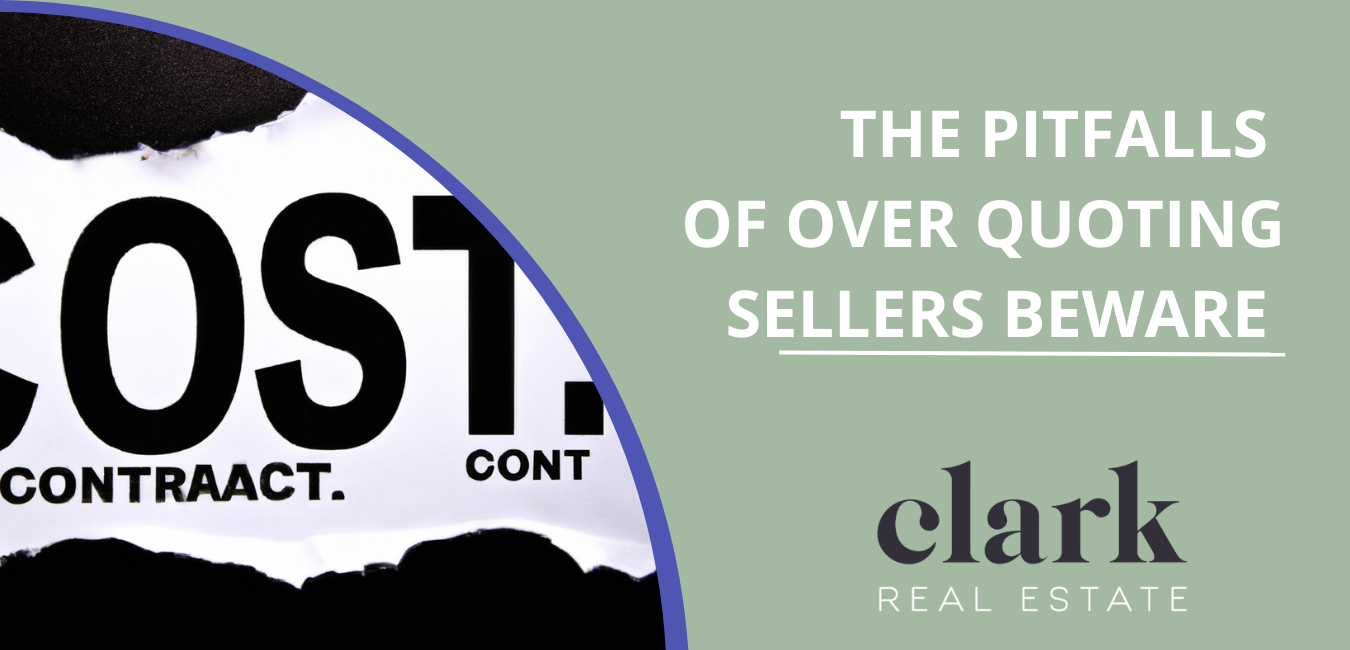
Introduction
When it comes to selling a home, one of the most crucial decisions a seller makes is selecting a real estate agent. An experienced and knowledgeable agent can help navigate the complex process of selling a property and maximize the sale price. However, not all agents have the seller’s best interest at heart, and some may resort to unethical practices to secure a listing, such as over quoting.
Over quoting is a deceptive tactic used by some agents to lure home sellers into listing their property with them. It involves quoting an inflated and unrealistic price to entice the seller, only to lower the price after the property is listed. Many home sellers in Australia have fallen victim to this trap, unaware of the negative consequences that can arise from over quoting.
In this article, we will delve into the downsides of overquoting and explore its impact in different cycles of the real estate market in Australia. We will also provide insights and tips for home sellers to protect themselves from this unethical practice.
Get An Instant Online Appraisal HERE!
Get An Instant Online Rental Appraisal HERE!
Get A Full Suburb Report HERE!
The Negatives of Overquoting
Overquoting can have detrimental effects on the selling process and the overall outcome for home sellers. Let’s take a closer look at some of the negatives of overquoting:
- False Expectations: When an agent overquotes the value of a property, it sets unrealistic expectations for the seller. The seller may believe their property is worth more than its actual market value, leading to disappointment and frustration when potential buyers show little interest or make low offers. This can result in a prolonged selling process and even cause the property to stagnate on the market.
- Loss of Credibility: Overquoting can also damage the credibility of the agent and the seller. If the property is listed at an inflated price and then repeatedly reduced, it can send a signal to potential buyers that the seller and the agent are not trustworthy or serious about selling. This can deter genuine buyers from considering the property, further prolonging the selling process.
- Wasted Time and Resources: Overquoting can waste valuable time and resources for both the seller and the agent. Preparing a property for sale requires effort, time, and money, including staging, marketing, and inspections. If the property does not sell due to overquoting, these resources can go to waste, resulting in unnecessary expenses and delays in the selling process.
- Missed Opportunities: Overquoting can also lead to missed opportunities for home sellers. If the property is priced too high, it may not attract potential buyers who are searching within their budget. As a result, the property may not receive as much exposure and interest as it deserves, and the seller may miss out on potential offers or competing bids.
- Lower Sale Price: Ultimately, overquoting can result in a lower sale price for the property. When a property is overpriced, it may stay on the market for longer, leading to price reductions and possibly selling below its actual market value. This can result in a financial loss for the seller and defeat the purpose of selling the property in the first place.
The Impact of Over Quoting in Different Cycles of the Market
The real estate market is cyclical, with periods of high demand and low supply, and vice versa. The impact of over quoting can vary depending on the state of the market, as it influences buyer behavior and market dynamics. Let’s explore how over quoting can affect home sellers in different cycles of the real estate market in Australia:
- Seller’s Market: In a seller’s market, where demand exceeds supply, over quoting may not have an immediate negative impact. Properties can sell quickly, and even if the property is overpriced, multiple offers from eager buyers may drive up the sale price. However, over quoting in a seller’s market can still have consequences in the long run. If the property is overpriced, it may attract fewer potential buyers, as they may be discouraged by the inflated price. This can result in a smaller pool of potential buyers and potentially limit the competition, leading to a lower sale price compared to pricing the property accurately from the beginning.
- Buyer’s Market: In a buyer’s market, where supply exceeds demand, over quoting can have a more severe impact. With more properties available for sale and fewer buyers in the market, overpricing a property can make it stand out as overpriced and unattractive to potential buyers. Buyers in a buyer’s market are often more cautious and price-sensitive, and an overpriced property may be overlooked or receive lowball offers. As a result, the property may stay on the market for longer, and the seller may be forced to lower the price significantly to attract potential buyers, resulting in a lower sale price than if the property was priced accurately from the beginning.
- Balanced Market: In a balanced market, where supply and demand are relatively equal, over quoting can still have negative consequences. Buyers in a balanced market are typically more discerning and compare multiple properties before making a decision. If a property is overpriced, it may not stack up against similar properties in the market, leading to fewer showings and less interest from potential buyers. This can result in a longer selling process and potential price reductions, affecting the overall outcome for the seller.
- Changing Market Conditions: Real estate markets can change over time, and over quoting can be particularly risky during market fluctuations. For example, if the market shifts from a seller’s market to a buyer’s market, an overpriced property that may have been attractive to buyers in a seller’s market may become unappealing and languish on the market. Similarly, if the market shifts from a buyer’s market to a seller’s market, an overpriced property that may have received lowball offers in a buyer’s market may miss out on potential higher offers from motivated buyers. It’s essential for sellers to stay informed about market conditions and work with a reputable agent who can provide accurate and up-to-date pricing advice.
In summary, over quoting can have varying impacts depending on the state of the real estate market. While it may not immediately deter buyers in a seller’s market, it can still result in a lower sale price in the long run. In a buyer’s market or a balanced market, over quoting can lead to fewer potential buyers, longer selling times, and potentially lower sale prices. Additionally, changing market conditions can further amplify the risks of over quoting. It’s crucial for home sellers to carefully consider the impact of over quoting in the specific market conditions they are selling in and work with a trustworthy agent who can provide accurate and realistic pricing advice.
The key to a successful property sale is not just selecting an agent based on their perception of the property’s worth, but also on their negotiation ability. When you engage an agent, you are essentially buying their expertise in negotiating the best price from potential buyers. Overquoting can lead to inflated expectations and unrealistic pricing, which can result in a property being on the market for longer periods, price reductions, or even no sale at all. Instead, it is crucial to choose an agent who has a proven track record of skilled negotiation, as they can effectively navigate the complexities of the real estate market and secure the best possible price that a buyer is willing to pay. By prioritizing an agent’s negotiation ability, home sellers can avoid falling into the trap of over quoting and increase their chances of a successful property sale.
FAQs
Q: What is over quoting in real estate?
A: Over quoting in real estate refers to the practice of setting an asking price for a property that is higher than its actual market value.
Q: Why do some agents over quote properties?
A: Some agents may over quote properties to win the listing from the seller, with the intention of lowering the price later on, or to make the property seem more attractive to potential sellers.
Q: What are the risks of over quoting for home sellers?
A: The risks of over quoting for home sellers include attracting fewer potential buyers, longer selling times, potential price reductions, and potentially ending up with a lower sale price compared to accurately priced properties.
Q: How can over quoting impact the different cycles of the real estate market?
A: In a seller’s market, over quoting may not have an immediate negative impact, but can result in a lower sale price in the long run. In a buyer’s market or a balanced market, over quoting can lead to fewer potential buyers, longer selling times, and potentially lower sale prices. Changing market conditions can further amplify the risks of over quoting.
Q: How can I protect myself from falling into the trap of over quoting?
A: To protect yourself from over quoting, it’s important to work with a reputable and experienced real estate agent. Look for an agent who provides accurate and realistic pricing advice based on current market conditions, and be cautious of agents who promise unrealistically high prices for your property.
Q: What should I do if I suspect my agent is over quoting my property?
A: If you suspect that your agent is over quoting your property, it’s important to communicate your concerns with them and request updated market analysis to determine the accurate value of your property. It’s also advisable to seek a second opinion from another reputable agent to ensure that you are getting accurate pricing advice.
Get An Instant Online Appraisal HERE!
Get An Instant Online Rental Appraisal HERE!
Get A Full Suburb Report HERE!

